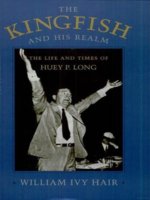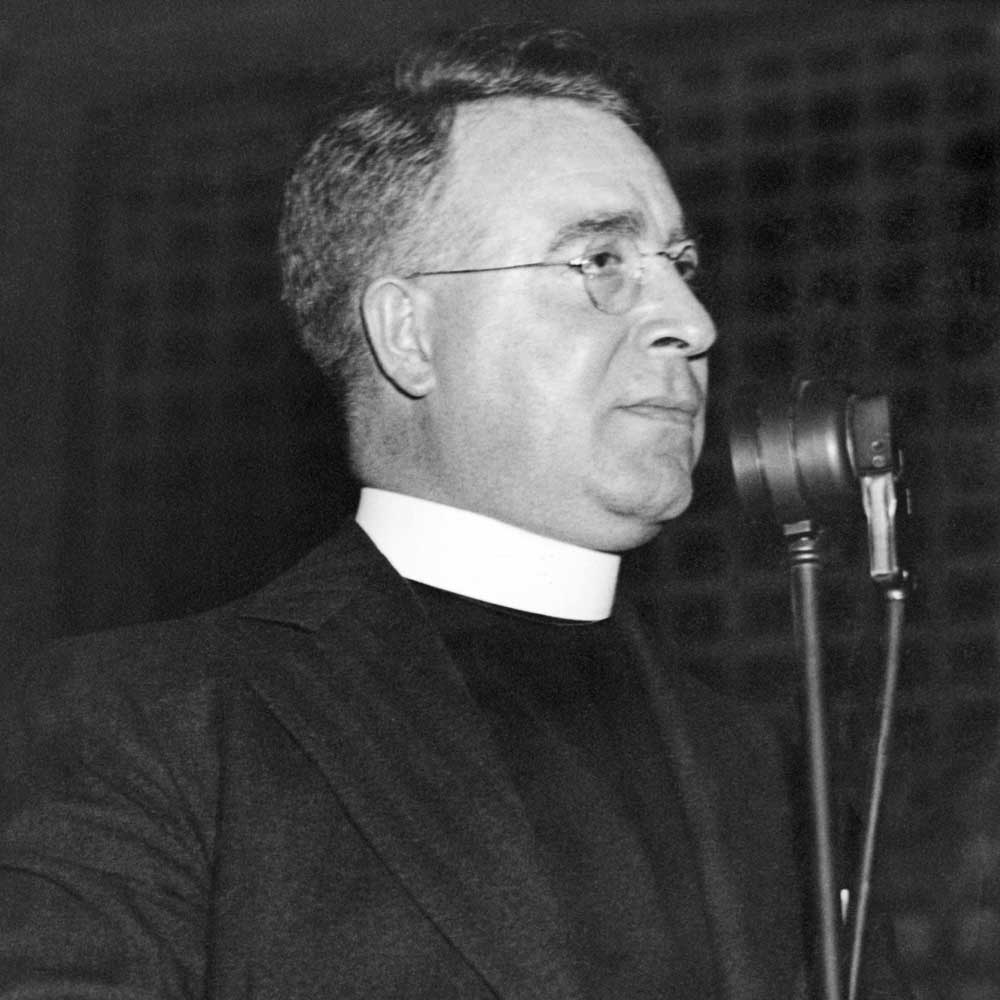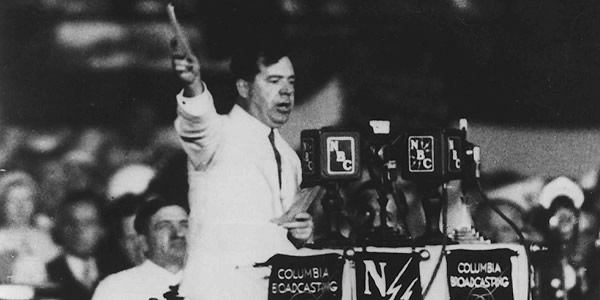Years ago I read T. Harry Williams’s authoritative and massive biography, ‘Huey Long’ (1969) of close to 1000 pages, long before my current presidential biography program.

Long aimed at the 1940 Democratic nomination, and to get it, he planned to put up a figurehead third party candidate like Father Charles Coughlin in 1936 for whom he would campaign vigorously.
 Father Coughlin
Father Coughlin
That figurehead would split the Democratic vote insuring that Franklin Roosevelt would lose to the Republican nominee, one Alf Landon, governor of Kansas. With Roosevelt discredited, Long would offer himself as the savior of the Democratic party and run in 1940, being confident he could beat any Republican. Historical precedent meant nothing to Huey Long but there was one in the way Teddy Roosevelt split the Republican vote in 1912 leading to Woodrow Wilson’s election.
 Huey Long
Huey Long
It is a plan devious enough for a Vice-Chancellor to appreciate.
Rather than re-read Williams’s tome I opted for a new look with William Ivy Hair’s ‘The Kingsfish and his Realm: The Life and times of Huey P. Long‘ (1991), an excellent book. It lives up to its title in a way a surprising number of alleged biographies do not. It is a fine piece of work, opening with two scene-setting chapters about Louisiana in the generation that reared Long. It is a shameful account of lynchings, mob violence, corruption, crushing poverty, rapacious corporations, murderous racism, rape, calculated impoverishment as a means of social control, murderous racism, all covered with a veneer of holier-than-thou Christian piety. The hypocrisy was as fetid as the bayou air in July. But this is the world the baby boy Huey was born to, and it turned out he could play its game better than anyone else.
He did not graduate from high school or college, yet gained entry to the Louisiana bar by combing buckets of smarm with pestilential persistence. In his early life he was a travelling salesman who sold anything to anyone, ice to eskimos, humidity to an asthmatic, books to the illiterate, Bibles to muslims, water to alcoholics, you name it. He was in fact a snake oil salesman for a time. From age sixteen for about ten years he travelled the backroads and byways of Louisiana, knocking at farm house doors, lintels at lean-tos, and talked to sharecroppers at the plow, and destitute woodsman on stumps. He had a prodigious memory and when he met someone a second time he asked by name about the wife, the mother, the brother. He also had an unnatural energy, sleeping three to four hours a night. If it was daylight, he was working. As fast as he made money, he spent it on cars, alcohol, and women. Note, most travelling salesmen of the era concentrated on small towns, not individual, isolated households. Years later when he campaigned for votes in these backwoods, he remembered enough names to astound, impress, and win over audiences. While he treated members of his entourage with contempt, he was always polite and respectful to voters. To be clear, it is memory. He did not keep a diary or write things down. He was in no way bookish.
From this early start his eye turned to political office when he was old enough, and the author suggests Huey had realized that was the metier where he could achieve not only material success but also power and social standing. He never tried physical labor, and the law, though a fine credential, was boring, yet he put on quite a show in court. But politics, well that was salesmanship writ large, and Huey was large, and he himself would be the product. He had no ideology.
Despite Long’s repeated claims to an early life of poverty, he was born to a middle class family and had a comfortable and stable home life. He was the second youngest of nine children. Like many sons he rebelled against his father, and the author sees in this a lifelong antagonism to authority (exercised by others over him). Ergo he always saw himself as a rebel even when acting the autocrat and conniving with the oligarchs who owned Louisiana.
When he was twenty-five, he met the age requirement for the Louisiana State Railway Commission, which in the wave of Progressivism at the turn of the Century– successful in parts of Louisiana–had been made an elected office. This commission regulated railroads which were certainly important, but also waterways, electricity, telegraph, pipelines, roads, and telephone. Where others saw a sinecure to pension off retainers or buy off enemies, Long saw a stepping stone and went for it with all the energy and audacity that made him the Kingfish. He outlied his opponent five-to-one. Facts were no barrier to Huey. No doubt Karl Rove learned from Long’s example.
He out stumped him one hundred-to-one. No one had ever campaigned for this office before and no one since has campaigned with the intensity he did, taking the state by storm. His energy was remarkable for that semi-tropical state. He talked, shook hands, remembered names, told lies, and made ludicrous promises twenty hours a day from the doorway of shacks to villages of twenty lumberjack families, to the streets of small towns, from the back of wagons, anywhere he could find one person or more. He always got by three or four hours of sleep, though later in life once a week, every ten days, or a fortnight, he would collapse for a day or more and sleep eighteen or twenty-four hours.
At the outset he steered clear of the old money planation strip along the river and the cities of Shreveport, Baton Rouge, and New Orleans where the Ring dominated, it being the bayou equivalent of Tammany Hall in New York without the efficiency. He besieged these forts from without, though those secure inside hardly noticed it at the time. More fool them.
Louisiana had even more racial, ethnic, social and economic cleavages than most states. The most exotic were the Cajuns who lived mainly in the Florida parishes east of the Big Muddy and along its eastern shores. These French-speaking people were mainly Catholic, but there were Huguenot descendants among them. Remember ‘Evangeline’? I sure do. See the note at the end.
The post-Reconstruction state constitution gave the governor more power than in the other forty-even states. For example, the governor had the authority to dismiss local town councils. These power were included to provide a bulwark against the black population, least it win some local control. The example of Haiti remained a spectre for many. These autocratic powers had not been used until Huey Long came along. He lost his first bid for governor and learned some lessons from that experience.
While waiting for the next gubenatorial election he volunteered to campaign for an incumbent United States Senator who faced a difficult challenge. He was a whirlwind who galvinized audiences in person. He also made full use of the radio, which at the time many regarded as a passing novelty. That success brought him further opportunites to campaign for others. Pause. He did this work, and he really worked at it, not out of alruism or ideology, but because he was builidng up his contacts and proving to one and all he was a vote getter. When the time came, he pushed aside those he had earlier campaigned for and usurped their organizations.
The second time around he was elected governor, and the whirlwind became a tornado. He doubled the number of state employees, and required each to pay a Long dividend to his political organization of 15% of their wage, a practice that continued for years. Those who won state building contracts were required to purchase supplies from sources owned by those friendly to Long, and their number grew to get those contracts. He divided his opponents in the legislature by intimidation, bribery, and his preternatural perception of an opponent’s weaknesses. He increased the power of the governor to the extent that every state employee served at his pleasure, and he hired and fired to get what he wanted, which was first subservience.
On he went. He won a Senate seat and put a stooge in the governor’s chair, and Long ran Louisiana from Washington, D.C. by telephone. He campaigned hard for Franklin Roosevelt in 1932, the two detested each other, and it was rare for anyone to get under FDR’s skin, but Huey did, and proved he could win voters over even in Republican strongholds like the Dakotas and Nebraska.
While he corrupted state government, bastardized the Senate election, and more, he was not personally corrupt in the popular sense. The money he raked in all went to pay his staff and fund his political campaigns against local opponents and for elections. He did not enrich himself. When he set his sights on the Presidency, which he certainly did, he stopped drinking, smoking, and swearing with a self-discipline no one thought he had. Yes, there were lapses. He married Rose young and she did not like the political life and as a result they lived largely apart. He had a long term mistress who worked in his private office, and that was that. He lived and breathed politics as a game to dominate opponents.
Then in September 1935 at forty-two years of age he was murdered in the foyer — I saw the bullt holes in the wall in 2004 — of the state capitol he had built. Why Dr. Weiss killed him is unknown and in that ignorance novelists and screen writers have poured in the usual human weaknesses, because they just do understand that Huey had no interest in women or money, but only in power.

There is much evidence of Long’s presidential ambitious, starting with his efforts to campaign for others across the nation. This is a standard exercise for future candidates to this day. He took to the radio, buying national time with the funds he extorted from Standard Oil, to develop a national profile and following with his bizarre ‘Share our Wealth’ clubs which could offer the skeleton of a national campaign organization, and he produced a book he dictated to secretaries in 1935 called ’My First Days in the White House.’ Get it?
Even more important is that state capitol in Baton Rouge. It is a high-rise tower far beyond the needs of Louisiana.
 Louisiana State Capitol Building with a statue of Long between it and the Little White House.
Louisiana State Capitol Building with a statue of Long between it and the Little White House.
It has forty-eight steps leading to the front door and each step is engraved with the name of a state of the union. It is a national building unlike any other state capitol. Across the mall from the capitol he built the Little White House with East and West wings. This White House is indeed white and its interior is decorated with motifs, murals, and memorabilia from all forty-eight states. There in Baton Rouge is an imposing capitol, a mall, and a white house. Get it?
The Kingfish was one of a kind. He was larger than life and achieved immortality from the hand of Robert Penn Warren, a poet with two Pulitzer Prizes for verse, and Poet Laureate of the United States twice. He wrote but one novel but what a novel, ‘All the King’s Men‘ (1947), and that too earned a Pulitzer. The opening chapter is hypnotic. A very young Warren had been a researcher for Senator Long. This book was the basis of the first of films portraying Huey Long in 1949 with Broderick Crawford, Mercedes McCambridge (before she went to the Devil in ‘The Exorcist’), and John Ireland. In 1995 John Goodman offered a creditable ‘Kingfish.’ In 2006 Sean Penn disinterred ‘All the King’s Men’ and made a hash of it. There have been many documentaries including Ken Burns’s with twanging banjo and the seasick camera moving over still photographs. The Paul Newman vehicle ‘Blaze’ in 1989, concerning Huey’s younger brother Earl, was a travesty. I boycotted his salad dressing for years afterward. Poor guy.
‘Evangeline’ was an 1847 poem by Henry Longfellow recounting the dislocation of 20,000 or so French settlers from a region called Arcadia in Nova Scotia and New Brunswick in the 1745-1755 period. To avoid British expulsion many moved voluntarily to Maine and further south. Those who transported went to Caribbean islands and to Louisiana. They joined the French settlers who had gone there from 1715. The original French were Huguenots escaping religious persecution in French, while the Arcadians were Catholic escaping religious persecution in Upper Canada. These latter became the Cajuns of the backwaters, hinterland, bayous, forests, swamps, and islands who developed a highly spiced cuisine to mask the tastes of water rats, snakes, bats, and such as was their diet. It is often red with pepper, chili, cayenne, and capsicum. Creole cuisine is much more refined in the French manner and its sauces are brown, thanks to the addition of butter. The rule of Louisiana cooking I learned is ‘If it is red, it is Cajun’ and ‘If it is brown, it is Creole.’
This is the story that inspired Longfellow’s 2000 line poem, which left an indelible mark on me. To a spotty eighth grader it was a INCOMPREHENSIBLE BORE THAT NEVER ENDED. We students wandered through the forest primeval of Longfellow’s dactylic hexameter for at least an eternity, and emerged older and none the wiser and just as spotty. In comparison Dante’s ‘Inferno’ was exciting.
Skip to content
